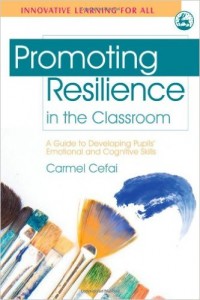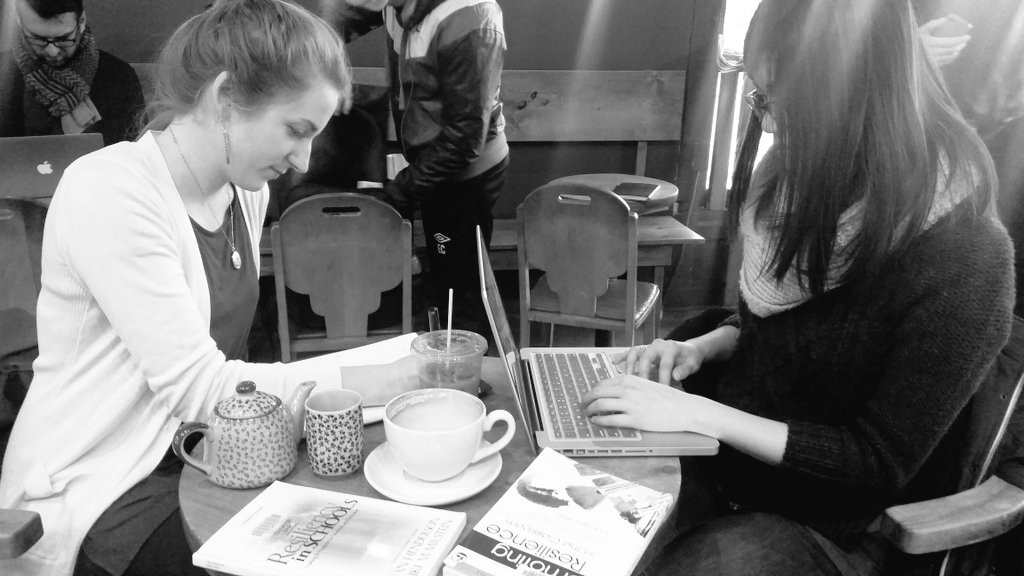T his week, I have been reading Promoting Resilience in the Classroom: A Guide to Developing Pupils Emotional and Cognitive Skills, by Carmel Cefai. Again, this presents a model of resilience-enhancing classrooms, which focuses on caring, prosocial, engaging, collaborative, and empowering classrooms. Within this, in order to achieve relatedness, autonomy, competence, and fun, Cefai (2008) suggests seven classroom processes that students should be a part of:
his week, I have been reading Promoting Resilience in the Classroom: A Guide to Developing Pupils Emotional and Cognitive Skills, by Carmel Cefai. Again, this presents a model of resilience-enhancing classrooms, which focuses on caring, prosocial, engaging, collaborative, and empowering classrooms. Within this, in order to achieve relatedness, autonomy, competence, and fun, Cefai (2008) suggests seven classroom processes that students should be a part of:
- Feeling connected with their teacher and their peers
- Being told that what they do is valid and worthwhile
- Are supported to engage in meaningful activities in which they feel autonomous and successful
- See their accomplishments and efforts recognised and celebrated
- Have their voice heard and their choices respected
- Share common values and beliefs related to learning all together cooperatively
- Work together collaboratively to achieve common goals
 Examining these models is allowing me to identify common themes, as well as gain some insight on what is important to me. What i’m finding is that there are many resiliency models out there, but the majority are theoretically based and don’t include the practical strategies that teachers can take and apply within their classrooms. This books does include case studies and practical examples, but most are aimed towards the primary grades. This is something I hope to develop with my own model of resiliency in the classroom, with perhaps creating a little mini-unit on teaching the importance of vulnerability and failure.
Examining these models is allowing me to identify common themes, as well as gain some insight on what is important to me. What i’m finding is that there are many resiliency models out there, but the majority are theoretically based and don’t include the practical strategies that teachers can take and apply within their classrooms. This books does include case studies and practical examples, but most are aimed towards the primary grades. This is something I hope to develop with my own model of resiliency in the classroom, with perhaps creating a little mini-unit on teaching the importance of vulnerability and failure.
References

 Within our learning teams, we are continuing on our “Finding Out” journey. Since last week, we have made some progress, although it is difficult with so many final deadlines for other courses taking priority. The nice part though, is that everyone is so passionate about their inquiry topic, so it is easy to jump straight back into it. This week, I have taken some small steps in listening to some TedTalks and taking out some books from the library. We also reached out by email to some inquiry and assessment experts in local school districts. I even sent out a Tweet (#resiliencechat) to see if the Twitter World has any words of wisdom for me. As I start to make my way through my many resources, my plan is to create a mind map over the next week in order to identify common themes and organize my thoughts. We have been using these frequently in our methods courses for unit planning, and i’ve found it particularly helpful in visualizing concepts and developing direction in projects.
Within our learning teams, we are continuing on our “Finding Out” journey. Since last week, we have made some progress, although it is difficult with so many final deadlines for other courses taking priority. The nice part though, is that everyone is so passionate about their inquiry topic, so it is easy to jump straight back into it. This week, I have taken some small steps in listening to some TedTalks and taking out some books from the library. We also reached out by email to some inquiry and assessment experts in local school districts. I even sent out a Tweet (#resiliencechat) to see if the Twitter World has any words of wisdom for me. As I start to make my way through my many resources, my plan is to create a mind map over the next week in order to identify common themes and organize my thoughts. We have been using these frequently in our methods courses for unit planning, and i’ve found it particularly helpful in visualizing concepts and developing direction in projects.